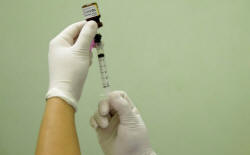|
 Dead
monkey prompts Sao Paulo to step up yellow fever vaccination Dead
monkey prompts Sao Paulo to step up yellow fever vaccination
 Send a link to a friend
Send a link to a friend
[October 24, 2017] SAO
PAULO (Reuters) - Health authorities launched a yellow fever vaccination
campaign on the north side of Brazil's largest city over the weekend
after a dead monkey was found infected with the disease, state and city
officials said on Monday.
|
|
 Two parks were closed following confirmation that one of five
monkeys found dead on Friday had yellow fever, raising fears of an
outbreak of the illness in metro Sao Paulo, home to 23 million
people. Two parks were closed following confirmation that one of five
monkeys found dead on Friday had yellow fever, raising fears of an
outbreak of the illness in metro Sao Paulo, home to 23 million
people.
Brazil is undergoing its worst yellow fever outbreak in decades. The
virus has killed at least 261 people since December, nearly all in
the southeast of the country. Millions of Brazilians have been
vaccinated as authorities scramble to prevent the outbreak from
turning into an epidemic.
Scientists do not know why yellow fever is rebounding in a country
that had all but eradicated the illness, especially in big cities.
Yellow fever, one of the deadliest tropical diseases, causes muscle
aches and fever and can lead to complications like jaundice and
kidney failure.
The World Health Organization recommended in March that travelers to
rural areas in the states of Rio de Janeiro and Sao Paulo get yellow
fever vaccinations.
The outbreak has so far been limited to "rural" yellow fever, which
is cases of the virus spread by mosquito species not common in urban
areas. It has infected some humans, but mostly monkeys.

[to top of second column] |

Yellow fever is found in tropical parts of Africa and the Americas
and is transmitted by the same type of mosquito that spreads dengue
and the Zika virus.

The mosquitoes feed on primates. The first sign that the disease was
back in Brazil was the discovery of hundreds of dead monkeys in the
Atlantic rainforest, where it has threatened the survival of rare
South American primates.
Yellow fever originated in Africa, where it is still a major killer,
and spread to the Americas on slave ships.
(Reporting by Anthony Boadle)
[© 2017 Thomson Reuters. All rights
reserved.] Copyright 2017 Reuters. All rights reserved. This material may not be published,
broadcast, rewritten or redistributed. |